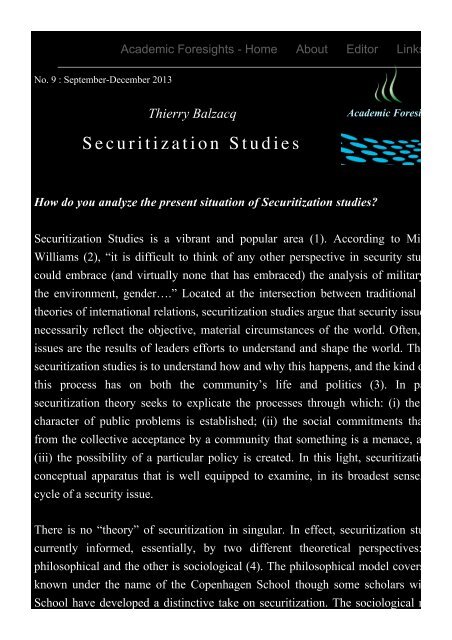Securitization Studies - Academic Foresights
Securitization Studies - Academic Foresights
Securitization Studies - Academic Foresights
- No tags were found...
You also want an ePaper? Increase the reach of your titles
YUMPU automatically turns print PDFs into web optimized ePapers that Google loves.
<strong>Academic</strong> <strong>Foresights</strong> - Home About Editor LinksNo. 9 : September-December 2013Thierry Balzacq<strong>Academic</strong> <strong>Foresights</strong><strong>Securitization</strong> <strong>Studies</strong>How do you analyze the present situation of <strong>Securitization</strong> studies?<strong>Securitization</strong> <strong>Studies</strong> is a vibrant and popular area (1). According to MichaelWilliams (2), “it is difficult to think of any other perspective in security studies thcould embrace (and virtually none that has embraced) the analysis of military affairthe environment, gender….” Located at the intersection between traditional and netheories of international relations, securitization studies argue that security issues do nnecessarily reflect the objective, material circumstances of the world. Often, securiissues are the results of leaders efforts to understand and shape the world. The tasksecuritization studies is to understand how and why this happens, and the kind of effecthis process has on both the community’s life and politics (3). In particulasecuritization theory seeks to explicate the processes through which: (i) the securicharacter of public problems is established; (ii) the social commitments that accrfrom the collective acceptance by a community that something is a menace, are fixe(iii) the possibility of a particular policy is created. In this light, securitization is tconceptual apparatus that is well equipped to examine, in its broadest sense, the licycle of a security issue.There is no “theory” of securitization in singular. In effect, securitization studies acurrently informed, essentially, by two different theoretical perspectives: onephilosophical and the other is sociological (4). The philosophical model covers whatknown under the name of the Copenhagen School though some scholars within thSchool have developed a distinctive take on securitization. The sociological modelsecuritization was not developed in one site in particular. Rather, it brings togeth
known under the name of the Copenhagen School though some scholars within thSchool have developed a distinctive take on securitization. The sociological modelsecuritization was not developed in one site in particular. Rather, it brings togethscholars of various walks of intellect (Belgium, Canada, France, UK, etc.) (5). In mview, there are three main differences between these two perspectives: first, the plathat each theory attributes to some important factors, such as the audience and conte(6); second, the way each theory conceptualizes the relations between politics ansecurity; third, the type of epistemology and explanatory mechanism that a given theois committed to. For instance, the philosophical view emphasizes language, while tsociological theory complements language with practices and, sometimes, with poliinstruments (7).<strong>Securitization</strong> theories have been extremely influential in examining issues as diverseglobal pandemics, migration, cyber-security, religious violence, and transnational crim(8). However, it is important to note that empirical studies of securitization have taugus a great deal about both the strengths and weaknesses of securitization studies. Potherwise, it would be wrong to conceive of empirical studies as mere applicationsexisting conceptual schemes as they often develop original extensions of a given theorIn your opinion, how will the situation likely evolve over the next five years?I have always found sloppy uses of the term securitization a tat disturbing. Of course,is normal that students entertain different understandings and uses of the concept“securitization”. For career, funding and publication matters, the concept seems to exea great “marketing appeal” on many scholars (9). However, if securitization is meantrefer to any construction of threats, what then is left of its theoretical identity? It wouactually be legitimate, under those circumstances, to ask: does it have any? Unlesecuritization scholars take this issue seriously, securitization theories wouldemptied of their distinctive contents. In other words, the primary challenge studentssecuritization would have to settle is, to delineate, more rigorously, what the boundariof securitization theories are. This would command, at least more than it’s been donefar, a more resolute engagement with other theories of security.Ken Booth (10), for instance, castigates the Copenhagen School for its lack of criticethos; on the other hand, despite its links with realism, some US scholars working in t
securitization seem to become prominent. This is not really surprising; actually tdiscussion is long overdue. In a fact, “the appropriate methods, the research puzzleand the type of evidence accepted all derive to a great extent from the kind of theoscholars bequeath their faith” (14). So, this is the first axis around which I could smore work being done, as it challenges students of securitization to clarify the coretheir theories, and the extent to which it relates to other forms of theorizing (normativempirical., etc.).The second axis, which I think might constitute a new domain of enquiry is trelationship between securitization and normativity. Rita Floyd (15) has put it in termof just/unjust securitizations. I propose to put it in terms of collective agency. Ocourse, there have been discussions on the responsibility of speaking or writing securi(16). I wish to displace the question, and hopefully change its nature. My interest isunderstanding the extent to which securitization establishes a collective agency. Whdoes this mean in term of collective responsibility if things go wrong? Who knowaddressing the issue of agency in securitization studies could be a path that would taus from risk/precaution to desecuritization, through cooperation, genocide and war (17The third and related axis might be around the long-term effects of securitization opeople’s life and the society’s texture, including rules of law, trust, and identity. Thisclose to the issue of whether securitization has a “logic” and what does that mean anentail? The other side of this axis would be to better understand the mechanismthrough which the “logic of security”, which is said to underpin securitization, cancontained, rolled back or dismantled. For a critical researcher, the issue is centrbecause it is difficult to study security policies and practices without dealing, finstance, with the following questions: what should people do in face of a securitizinmove that they deem inappropriate? How should they act when an issue has besecuritized? What strategies should they deploy when they live within a securitizsite? Are the strategies of equal strength, merit and ethical status? (18)Notes:(1) For most recent discussions of different versions of securitization, see Thierry Balzaced., <strong>Securitization</strong> Theory: How Security Problems Emerge and Dissolve (LondoRoutledge, 2011; “The Politics of <strong>Securitization</strong>’, Special Issue of Security Dialogu
(1) For most recent discussions of different versions of securitization, see Thierry Balzaced., <strong>Securitization</strong> Theory: How Security Problems Emerge and Dissolve (LondoRoutledge, 2011; “The Politics of <strong>Securitization</strong>’, Special Issue of Security Dialogu42(4-5), August-October 2011). The first rendition of securitization can be found in BuzaBarry, Ole Wæver, and Jaap de Wilde. (1998) Security: A New Framework for AnalysLondon: Lynne Rienner.(2) Williams, Michael C. (2011) The Continuing Evolution of <strong>Securitization</strong> Theory.<strong>Securitization</strong> Theory: How Security Problems Emerge and Dissolve, edited by ThierBalzacq. London: Routledge, p. 212.(3) Huysmans, Jef. (1998) Revisiting Copenhagen: Or, on the Creative Development ofSecurity Agenda in Europe. European Journal of International Relations 4: 479-505.(4) Balzacq, Thierry. (2011a) A Theory of <strong>Securitization</strong>: Origins, Core Assumptions, aVariants. In <strong>Securitization</strong> Theory: How Security Problems Emerge and Dissolve, editedThierry Balzacq. London: Routledge.(5) For instance, Jef Huysmans, Philippe Bourbeau, and Mark Salter. Some might also aDidier Bigo, but I am unsure whether he would accept being brought under securitizatistudies. Thought his work on (in)security professionals clearly overlaps with some concerof securitization studies, Bigo has a distinctive research agenda, one which cannotdescribed as directly falling within securitization studies. See, for instance, Bigo, Didie(2002) Security and Immigration: Toward a Critique of the Governmentality of UneasAlternatives 27: 63-92.(6) On audience, see see Léonard, Sarah, and Christian Kaunert. (2011) Reconceptualizithe Audience in <strong>Securitization</strong> Theory. In <strong>Securitization</strong> Theory: How Security ProblemEmerge and Dissolve, edited by Thierry Balzacq. London: Routledge. On context, see SalteMark B. (2008) <strong>Securitization</strong> and Desecuritization: A Dramaturgical Analysis of tCanadian Air Transport Security Authority. Journal of International Relations aDevelopment 11: 321-349; Ciută, Felix. (2009) Security and the Problem of Context:Hermeneutical Critique of <strong>Securitization</strong> Theory. Review of International <strong>Studies</strong> 3301-326.(7) Léonard, Sarah. (2010) EU Border Security and Migration into the European UnioFRONTEX and <strong>Securitization</strong> through Practices. European Security 19: 231-254.(8) It is impossible, given the space restrictions, to give a full account of the empiricatheoretical work carried out by securitization scholars. Here’s a (non-representative) sampBarthwal-Datta, Monika (2012) Understanding Security Practices in South Asi
FRONTEX and <strong>Securitization</strong> through Practices. European Security 19: 231-254.(8) It is impossible, given the space restrictions, to give a full account of the empiricatheoretical work carried out by securitization scholars. Here’s a (non-representative) sampBarthwal-Datta, Monika (2012) Understanding Security Practices in South Asi<strong>Securitization</strong> Theory and the Role of Non-State Actors. London: Routledge; Ceyhan, Aysand Anastassia Tsoukala. (2002) The <strong>Securitization</strong> of Migration in Western SocietieAmbivalent Discourses and Policies. Alternatives 27: 21-39; Curley, Melissa, and Siu-LWong, eds. (2008) Security and Migration in Asia: The Dynamics of <strong>Securitization</strong>. LondoRoutledge; Hansen, Lene. (2011a) Theorizing the Image for Security <strong>Studies</strong>: Visu<strong>Securitization</strong> and the Muhammad Cartoon Crisis. European Journal of InternationRelations 17: 51-74; Bourbeau, Philippe. (2011) The <strong>Securitization</strong> of Migration: A StudyMovement and Order. London: Routledge.(9) This is a perceptive comment made by Xavier Guillaume at an IR Seminar, at tUniversity of Edinburgh, in 2013.(10) Booth, Ken. (2007) Theory of World Security. Cambridge: Cambridge University Press(11) For a notable exception, see Hayes, Jarrod. (2009) Identity and <strong>Securitization</strong> in tDemocratic Peace: The United States and the Divergence of Response to India and IranNuclear Programs. International <strong>Studies</strong> Quarterly 53: 977-999.(12) See, inter alia, McDonald, Matt. (2008) <strong>Securitization</strong> and the Construction of SecuritEuropean Journal of International Relations 14: 563-587; Vuori, Juha A. (200Illocutionary Logics and Strands of <strong>Securitization</strong>: Applying the Theory of <strong>Securitization</strong>the Study of Non-Democratic Political Orders. European Journal of International Relatio14: 65-99; Stritzel, Holger. (2007) Towards a Theory of <strong>Securitization</strong>: Copenhagen aBeyond. European Journal of International Relations 13: 357-383.(13) See Balzacq, Thierry. (2011b) Enquiries into Methods: A New Framework f<strong>Securitization</strong> Analysis. In <strong>Securitization</strong> Theory, edited by Thierry Balzacq. LondoRoutledge.(14) See the forthcoming forum on “What Kind of Theory (if any) is SecuritizatioInternational Relations. Contributors include: Thierry Balzacq, Stefano Guzzini, HeikPatomäki, Ole Wæver, and Michael C. Williams.(15) Floyd, Rita. (2010) Security and the Environment: Securitisation Theory and UEnvironmental Security Policy. Cambridge: Cambridge University Press.(16) This is sometimes described as a fundamental paradox. In particular, see Huysmans, Je(2006) The Politics of Insecurity: Fear; Migration and Asylum in the EU. Londo




